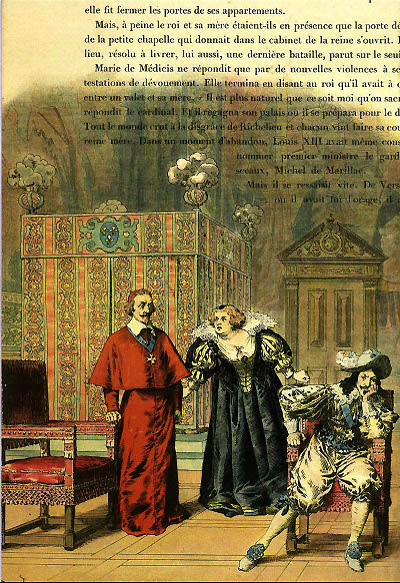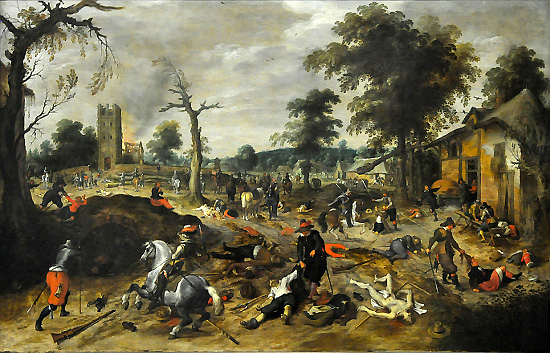A TANTRUM CHANGES THE COURSE OF HISTORY... FOR AWHILE
Will Louis help the poor with peace and tax reform, or grind them down still further with higher taxes due to war?
Marie loses her temper against Prime Minister Richelieu in the king's presence. That disrespect brings the crisis called the "Day of Dupes," and Louis's choice for Richelieu and war.
(November 10-11, 1630)
Basic account:
The Recollections of the Duke of Saint-Simon, who was present immediately after the event,
as told his son (the memoirist).
Presented with comments by Georges Mongrédian,
La Journée des Dupes, 1961
A hagiography
Bishop of a destitute commune of western France (Luçon), Richelieu believed that to make the poor work they must be treated like mules. He also confirmed Louis XIII's authoritarianism and helped found the centralized French State. Conservative historians admire him.
# # #
- Richelieu comes to power by helping Marie return to favor after her fall, then takes her place as the king's main counselor. She hates him for that betrayal* and for his policies of violence.
*A subordinate's loyalty was considered automatic and the difference in rank made him her servant.
Maurice Leloir
Richelieu throws himself at her feet...
kisses the hem of her robe, bursts into tears and begs the king to let him return to his lands. When Louis says nothing, he leaves. A few minutes later the king passes before him and meets his bow with glacial silence. Fearing arrest and execution, recalling Concini's mutilated corpse and the rapidity with which one's fate can change, he prepares to flee.
At home, Louis "threw himself on his bed and tore off his doublet so furiously that the buttons flew off." But after reflection at his hunting lodge at Versailles, he sends for Richelieu to join him. Shocked by Marie's disrespect for monarchy shown by her language in his presence, he makes a decision that is almost unimaginable then, of choosing an underling over the queen of France, widow of Henri IV and mother of the Duchess of Savoy and queens of Spain and England. As well, though deeply religious he transgresses the commandment "Honor thy father and thy mother," an act for which he will feel remorse for the rest of his life.
Certain that she has won the showdown, Marie appoints Michel de Marillac,* the head of the Catholic pro-peace faction, Prime Minister. But the resurrected Richelieu has him arrested; he will die in prison. He also has Marillac's brother, the Captain of the Royal Guard, decapitated on a trumped-up charge, to send adversaries the message that opposing him will affect their families too.
*Uncle of Saint Louise de Marillac. For more about her and the impressive Catholics of the time, please click.
# # #
Marie remains Richelieu's implacable opponent, and helps Gaston foment the revolts that follow. She dies in exile (in 1642) almost without resources, saying that her only regret is forgetting to bolt a door.
- Misogyny and nationalism lead to dismissing her as "without grace, heavy, with eyes that were round and inexpressive, brutal gestures and incurable vulgarity [...] silly, proud, short-tempered, opinionated, lazy."
-- Richelieu by Philippe Erlanger, 1996, p.77.
More objective but still negative:
Marie de Médicis by Philippe Delorme, 1998, and
Les Reines de Queens sous les Bourbons by Simone Bertière, 2003
- She can also be seen as feisty and determined, and above all be respected for trying to maintain peace.
# # #
With her fall, France lurches into the Thirty Years' War:
- Central Europe loses a third of its population and Burgundy, Lorraine and Picardy are devastated. Fifty years later Protestants fleeing France find a welcome from German princes wishing to replace slaughtered populations.
The Pillaging of Wommelgen by Sebastian Vranx, 1625-30 / zoom |
- Most of the kingdom is spared fighting on its soil, but taxes and requisitions bring revolt and repression:
Les Misères de la guerre : pendaisons [hangings] by Jacques Callot, 1632-1633 / zoom
This war of twists, turns, countries and factions is hard to follow. Jacques Callot's etchings, Les Grandes Misères de la guerre [war], state the essential (for the 16 etchings, please click and scroll down).
# # #
The "Day of Dupes" is considered one of "The days that made France " ...*
* Title of the series in which the study mentioned at the top of the page.
Because, it is said, bringing the country into that struggle kept Spain from dismembering or conquering it.
But in the 1630's...
- Spain had 8 240 000 residents, France 20 000 000 (please click).
- Spain's economy was archaic, France's one of emerging capitalism.
A Spanish victory was impossible
and French hegemony in the long run inevitable.
# # #
Children can play the scene, thinking up insults ("Your socks stink!") They'll roll around laughing and love history.
They can question that anecdotal approach later.
End of this section.
* * *
Next section,






No comments:
Post a Comment